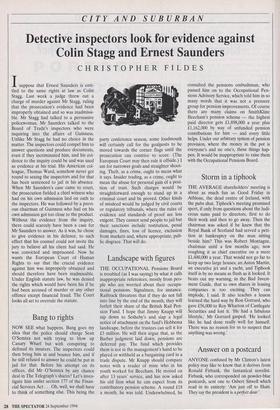CITY AND SUBURBAN
Detective inspectors look for evidence against Colin Stagg and Ernest Saunders
CHRISTOPHER FILDES
Isuppose that Ernest Saunders is enti- tled to the same rights at law as Colin Stagg. Last week a judge threw out a charge of murder against Mr Stagg, ruling that the prosecution's evidence had been improperly obtained and so was inadmissi- ble. Mr Stagg had talked to a persuasive policewoman. Mr Saunders talked to the Board of Trade's inspectors who were inquiring into the affairs of Guinness. Unlike Mr Stagg he had no choice in the matter. The inspectors could compel him to answer questions and produce documents, even if they incriminated him, and his evi- dence to the inquiry could be and was used as evidence at his trial. His American col- league, Thomas Ward, somehow never got round to seeing the inspectors and for that has been sentenced to jail in his absence. When Mr Saunders's case came to court, the prosecution fielded a chief witness who had on his own admission lied on oath to the inspectors. He was followed by a previ- ous chairman of Guinness who had on his own admission got too close to the product Without the evidence from the inquiry, there could scarcely have been a case for Mr Saunders to answer. As it was, he chose to give evidence in his defence, to such effect that his counsel could not invite the jury to believe all his client had said. He was convicted and imprisoned. Now he wants the European Court of Human Rights to say that the crucial evidence against him was improperly obtained and should therefore have been inadmissible. Under English statute law, he was denied the rights which would have been his if he had been accused of murder or any other offence except financial fraud. The Court looks all set to overrule the statute.


































































 Previous page
Previous page